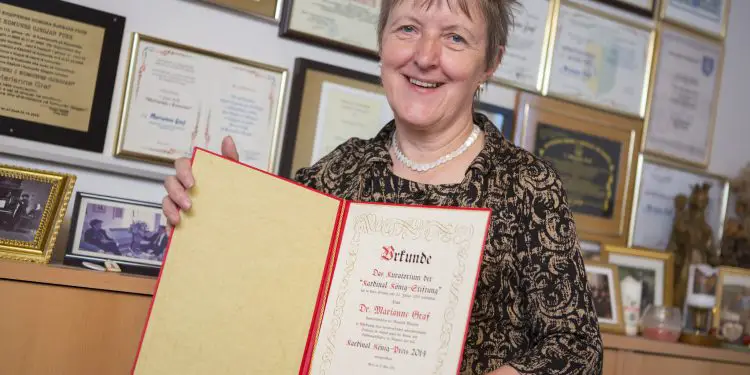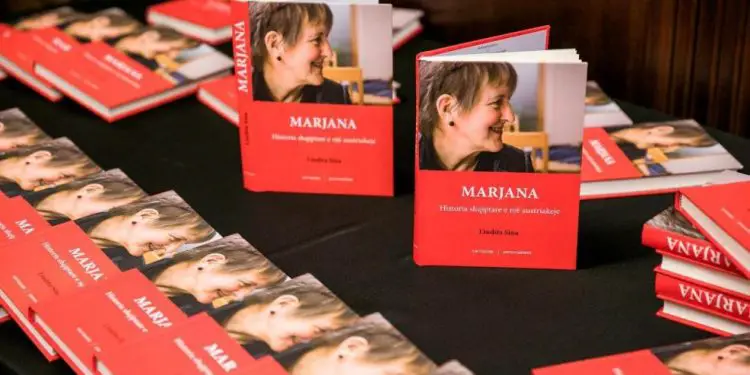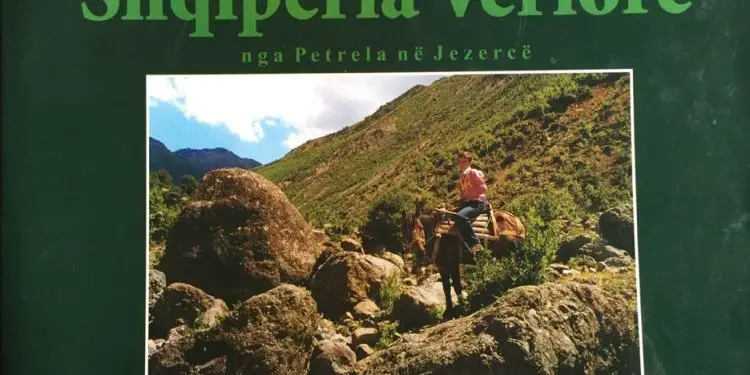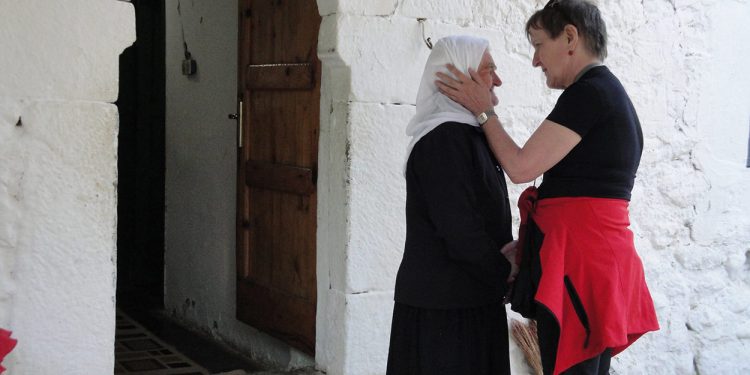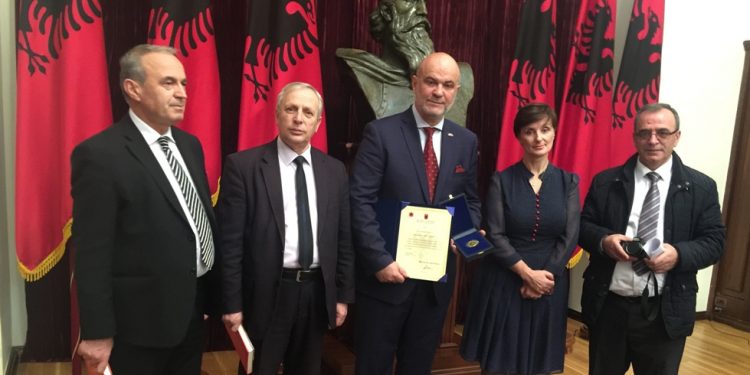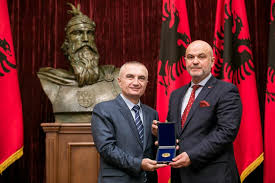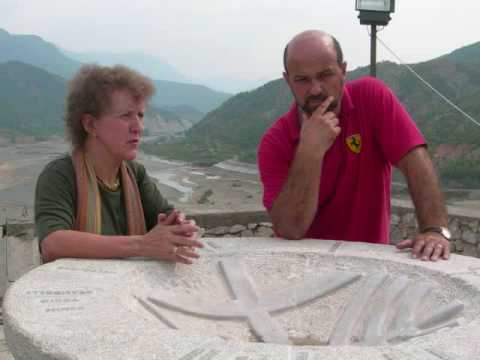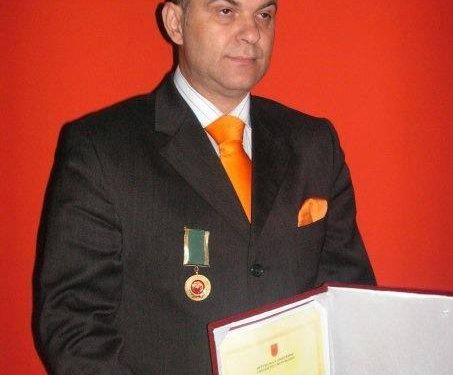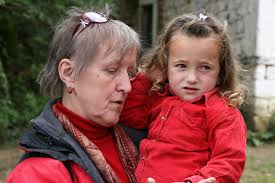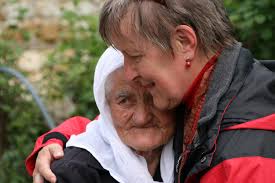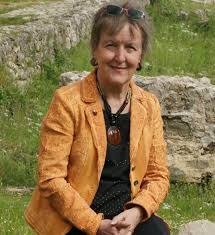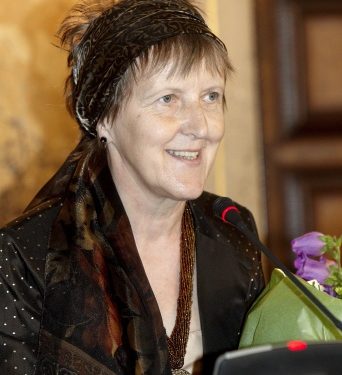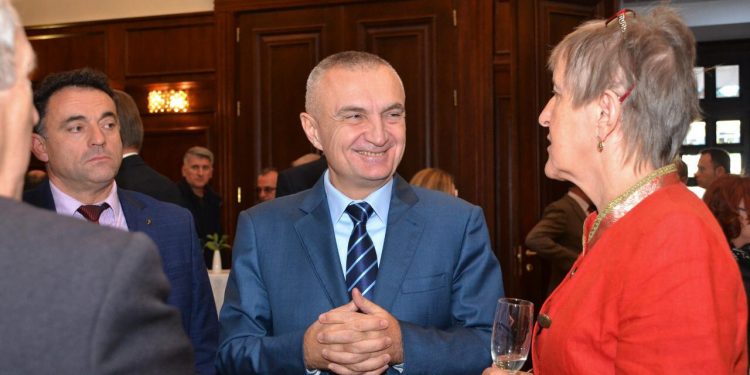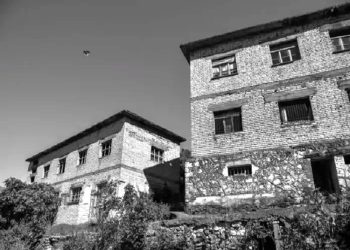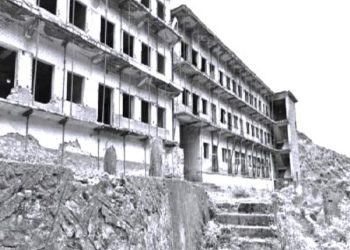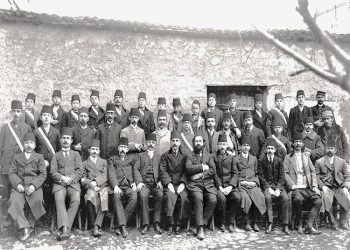Dashnor Kaloçi
Memorie.al publishes the unknown story Dr. Marianne Graff, from Graz, Austria, the famous humanist and philanthropist who was brought to Albania by chance sometime in the beginning of 1992 and in this “forgotten place of Southern Europe”, as she describes Albania, love kept her. It has even gripped it so badly that it is no longer detached from it, considering it a second home. The adventure of Dr. Marianne Graff, the humanist who in cooperation with the well-known activist and businessman from Kosovo, Skënder Thaçi, for 28 years, has brought millions of dollars in aid to our country. Finally, an illustrated album, entitled “Northern Albania from Petrela to Jezerce – A forgotten piece of Southern Europe”, which is more than a tourist guide, for which they have given their appreciation, the former Minister of Culture, Bujar Leskaj, Honorary Consul of Austria in Shkodra, Gjergj Liqejza and her close associate, Skënder Thaçi.
That February afternoon, with heavy rains of the distant year 1992, as he descended the stairs of “Malev” alone at the Rinas International Airport, about which he had heard very little from the agencies of foreign agencies and had no idea smaller than what was happening there, and as he traveled with an old “Zuk” that shook along the road full of pits filled with water which continued to the center of the capital, Tirana, Dr. Marianne Graff did not realize that she had embarked on an “adventure” that would last a long time in her life. She had never thought she had come to a place from where she would never leave. Not only that, but to dedicate herself to him with all the power of her soul, (like her former compatriot, Edit Durham), with an even greater contribution, that they have made her known as one of the humanists most famous, not only in Europe but also beyond. Although 28 years have passed since that distant time and Dr. Graff, thanks to her personal contribution, has made it possible to bring millions of dollars in aid to: kindergartens, nurseries, schools, hospitals and dozens of other socio-cultural facilities, as well as food packages, clothing and medical supplies for the sick and the sick. of the population in need, she is still not satisfied with what she has done for Albania, which she considers a second home. As she continues her humanitarian mission in this country with the same passion and dedication as in its beginnings in the distant year 1992, for years, Mrs. Graff has made another gift for this country: An illustrated and extremely luxurious album , entitled: “Northern Albania from Petrela to Jezerce-A forgotten piece of Southern Europe”. More than a tourist guide, this album, which is undoubtedly one of the most luxurious that foreigners have ever published about Albania, is also a serious study of culture, customs, traditions, flora, fauna, geography, history. , and everything else has to do with Northern Albania, from Petrela to Jezerce. But better for this, Mrs. Graff herself tells us, in the introduction of her album, (which we are publishing in full), where are given the considerations of the former Minister of Culture, Youth and Sports, Mr. Bujar Leskaj, together with those of the Honorary Consul of Austria in the city of Shkodra, Mr. Gjergj Liqejza, and Mr. “Skënder Thaçi, the main collaborator of Mrs. Graff, who has not been separated from her for any moment during the 28 years of her humanitarian mission in Albania”.
Graf: That is why Albania became my second homeland
“I knew Albania being very far from Albania, still without directly perceiving its existence. My acquaintance with her came as a result of my love for the native mountain world, as well as numerous trips for the purpose of study with my husband. I found the life of its highlanders in poverty on the heights of Nepal and Yemen, as well as in my parents’ stories about the struggle for the existence of Austrian peasants in the past. The strength of her patriarchal family ties I felt in the strong resistance of large families in the Alps and Southeast Asia, and respect for the elderly, gave me the opportunity to know her in many African tribes. Therefore, during my first visit to Albania in the beginning of 1992, I was not so surprised, because many things that I encountered here, seemed familiar to me. But I was amazed and unaware of the great lack of hope, of the great divisions and disagreements that existed here among the people, of the communist conformism that was encountered everywhere, of the lack of any infrastructure, and of the 700,000 bunkers, which, as creatures of scary, they covered the place like boils. Also, the good knowledge of the situation and the desperate view of this country, not only made Albania enter my heart, but also convinced me to make the decision to help it with the greatest dedication, regardless of the consequences. Albania, with a vast and infinitely beautiful landscape is ruthless with its inhabitants. This comes from an extremely poor land, but we are somewhat distracted from the painful past, which under tyranny during recent history, reached a torturous climax. A brutal system that completely overthrew the old order, caused many casualties and irreparable damage to cultural property, quarantined the country for decades, created many problems for people, which, despite their efforts, are not able to solve them alone. My understanding of this problem, my way of behaving as a result of this understanding, but also the language, which is the best key to understanding a people, enabled me to enter and contact with all strata of the population of this country. They opened for me valleys and huts, which usually open with difficulty to foreigners. I remember with pleasure from those remote villages hanging wooden bridges (catwalks), and paths, from where you could end up on the precipice, the touching hospitality in the simple dwellings “clean with flea bites”, icy nights and the healing warmth of the species plenty of mountain tea and brandy. To drink smelly tobacco with the villagers and shepherds and to experience with former prisoners the bad taste of human contempt and death in the former prisoners’ camps, to escape, together with the helpers, the stones that fell down the rock , sliding in the mud, as well as threatening Kalashnikovs, dreaming with artists and having heated discussions with politicians, these are more than interesting events. All these experiences, meetings and joint conversations with Albanians, helped me to know and understand with all my senses this place, therefore I am grateful to all those who gave me this opportunity. It is not surprising that this is exactly how Albania became my second homeland. That is why I say that every time I travel and wherever I arrive – in Austria or Albania – I come home “.
Graff: Special thanks to those who helped me
“I thank all those who made me feel at home, all those who made a path together with me, all those who taught me a lot and became my guides. But in particular, I want to thank my husband for his energetic, boundless support and his position as a “rock” in stormy times, as well as Skënder Thaçi, our Albanian friend, patient and tireless, helper and companion, who, me and my husband, but also friends and helpers from Austria, has always and everywhere stood by us. We are all united by the appreciation for Albania. This appreciation and respect for Albania were also the motivators for the publication of this book. This book should not be merely a travel narrator and should not at all have the claim of a scientific research. I am aware that during the countless stays of the last ten years I have known Albania well, better than many others, but I am also aware that much remains undiscovered by me and that I have only achieved to the middle to understand it well. With texts and photographs I try to combine my personal impressions and experience, but also the stories and knowledge that exist, into a whole, which although there are many shortcomings, difficulties and forgetfulness, should be an expression of love for this country. and for his people. In this spirit, I am working to write the continuation of this book, for Southern Albania. I very much want this book to contribute to a better understanding of this place. But I also want to find people who are committed to him, who keep everything unique and who is worth protecting. Let my dear Northern Albania find as many friends as possible, well known, trampled and proud “.
Graf: Why did I reflect the good side of Albania ?!
“If anyone would like to scold me for the fact that in my photos I have captured only the best parts of Northern Albania, he is right. This book is dominated by my attempt to show what is worth preserving and watching, despite the misery, already known, and the classification of Albania as: The Backyard and the House of the Poor of Europe. As for the problems, they are adequately addressed in the text. I would also like to open the eyes of readers to the magnificent landscape and the small beauties that exist in this country in abundance alongside this sadness. And, in any case, it is the positive evaluation that pushes forward and gives you the courage to become aware of your strength, which makes it possible to cope with the tasks of the present and the future.
Former Minister Bujar Leskaj: Graf’s book, a call to the world
“A good friend is known in difficult days. So making friends means adding new dimensions to life, pride and immortality. To have friends means to avoid selfishness, loneliness and isolation. Whoever is rich in friends is rich in love, nobility, mental and spiritual values, whether personal or national. A single man is as much as humanity itself. That is why Albanians are lucky, because today three more friends are added: Marianne Graff, her child, the book “Northern Albania-From Petrela to Jezerce-A forgotten piece of Southern Europe”, and, above all, her country Austria. This book is not only a tourist guide of Northern Albania, but also a cordial invitation for foreign and domestic tourists to visit this “forgotten piece of Southern Europe”, rich in fascinating landscapes, cultural, traditional and historical treasures. , as well as very kind and hospitable people, who live in extremely difficult conditions and need care and help. Her descriptions, accompanied by photographs and lyrics, reveal to the reader a vivid and comprehensive picture of our Northern Highlands and their inhabitants with seven pine-trees; with faces like heavens laden with shining suns and moons; with souls like fresh and undisturbed waters, emanating from the depths of ancient Illyrian lands; with an ever-clear mind, with a rich and sweet language, which even the singing birds envy. According to her, ‘Highlanders adorn life, space and time. They are calm and thoughtful. Talk a little and only when needed. They do not use words just to hurt. They are never afraid of anything because they know that fear does not allow you to grow, to become Man, to enjoy life, to love, nor to choose peace and harmony in all times and selves. They are therefore generous, generous, and unyielding. Therefore, they are very proud and by no means refuse to lose their honor, because that way they would become nothing. ‘ Marianne Graff’s book is a call to the world, and especially to Europe, to pay due attention to our country, which, due to decades of complete isolation, is still a “forgotten part” of it. Meanwhile, it is a clear proof of the strong friendly relations between our two nations, as well as an important contribution towards the promotion of national and cultural tourism, which remains a priority of the Ministry of Culture, Tourism, Youth and Sports of the Republic of Albania. . That is why we are all grateful to Her, believing that this book will make our country more friendly and kind. ”
Gjergj Liqejza: Mrs. Graff’s album has been very well received in Austria
“Austria, in these last two centuries, is without a doubt, the country that has embodied and shown, in all directions, a true friendship with Albania. There is no political, socio-economic field of development of Albania in the late nineteenth and early twentieth century, without the hand, mind, and contribution of Austrian linguists, archaeologists, historians, engineers, and humanists. This tradition and this trace of friendship and kindness of the Austrian nation have motivated Mrs. Marianne Graff to organize the humanitarian association Albania-Austria immediately after the liberation of our country from totalitarian isolation, which lasted almost 50 years. She was dedicated with unparalleled love and nobility to help people in need, so her humanitarian and constructive activity exceeded the limits of imagination, when she sees 40 new health, educational and cultural facilities of northern Albania and thousands of aid packages. scattered with her hand. Her commitment during the Kosovo crisis was extraordinary. For Mrs. Graf had another goal: to know and understand Albanians and their country as well as possible. During the nearly 28 years of her activity, she proved that she is not just an outstanding missionary of humanism. But also an in-depth observer and analyst of life, history, tradition, culture and customs in every place where her foot treads. This she reflects best in this album, among the highest quality and special that is dedicated to our country by a foreign author. In this work, Mrs. Graff, with art, with skill, has fixed and reflected real pieces of life, of ordinary people, all these intertwined with rare artistic photos of Albanian fascinating nature, but also descriptions of the severely creepy socio-economic situation in this piece of land in Europe. This album, first published in German, has been well received in Austria and elsewhere and will be appreciated more than anywhere else here in Albania. Appreciation and respect for the work and activity of Mrs. Graff, have been expressed, primarily by ordinary people, but also in institutional ways, because she has been awarded many prizes and various honorary titles in Albania. With this wonderful album, Mrs. “Graff makes another special contribution to the long-standing friendly ties between Austria and Albania.”
Skënder Thaçi: I am a fellow traveler in Graff’s incomparable work
“I had the good fortune to tread together with Mrs. Graf every corner of Northern Albania on foot, on horseback and with motor vehicles; To carry, on my back, with my hands, hundreds of thousands of aid packages for people in need in those areas; To put together hundreds of thousands of miles in what any expedition of any kind would envy; To keep so many bricks, tiles, lime, cement, iron, doors, windows, and furniture of schools, ambulances, and kindergartens, that every municipality and commune would envy him; To care for families suffering the threshold of hunger in the most forgotten areas of Albania; To help children with mine-broken legs, with ruined kidneys, with long incurable diseases; To touch the harsh and painful reality of my country down to the last detail, to the point where it transforms into tears, pain misery; To feel to the core the cold of winter in the house where the wind as it entered came out unimpeded from one side to the other; I have been fortunate to witness what most of my compatriots do not even think exists in their own country; I have spent tens of hundreds of nights in the poorest houses, possibly the poorest, to deeply feel the pain of poverty, the weight of being left aside by man, the pleasure of their hospitality; And I have learned how little they know about the value of things in this world. There would be an ambulance where mothers who would take care of the area with younger generations would receive first aid; Where would the first pains of sick people be extinguished; There would be a garden where the little ones of the future would chirp; At each return there would be a tiny bridge, catwalk, connecting two shores of life, two communities, and much human love; On each return, there would be a new care for the unfortunate or unfortunate, there would be clothes, food, transport and medical care in Austria’s best hospitals for forgotten people. In this long journey, which is now in the second decade, and which is reflected in this book, more than anything he had and still has pride and humanism. In every page of this book you will find exactly the one who made me follow step by step the honorable Lady Marianne Graff, the simple humanist, the prominent Austrian, the man who became known for her endless humanitarian works in Albania- human care. The images cast in the pages of this book by Mrs. Graff, with her husband, the revered Wilhelm, did not dictate to her such a large and difficult undertaking which seems to end indefinitely. There was no need for the Counts to help Albania. It was their humanism as sons of a noble people who had never turned their backs on my decision, Albania. And when I saw that this honorable couple was doing so much, collecting with drops every help they could in their beautiful Graz for the people of my country, I devoted myself to them. And I feel like I did the best I could do in this life. That is why I am proud. That’s why I feel like I’m there, behind Mrs. Graff’s camera. I feel like I am her companion throughout this journey. So I want to thank Mrs. Graff, for this wonderful book, for what you have done for my country. “Thank you for making me a companion of your unique work.”
Helmut Khol and Mikael Gorbachev, medals for Marianne Graf
The well-known charity Dr. Marianne Graff was born in 1951 in the famous city of Graz and currently resides in Gossendorf in Steiremark, Austria. For more than 28 years, she has been leading the humanitarian organization “Albania-Austria Partnership”, which she founded and set up in 1992 together with her husband, Dipl. Ing. Helilhelm Graf. Since that year, Marianne Graff has visited Albania several times a year, and as a result of her humanitarian activity, has established constant and very good contacts with all segments of the population in our country. Her deep understanding of the problems Albania is going through, her cordial demeanor and the linguistic knowledge she has created over the years, have made it possible for Graff to enter freely into the valleys and alps of the north, into the huts of the Albanian highlanders. , which usually have not been very frequented by foreigners. For her dedication and tireless work, for her social contribution, commitment to human rights, as well as for her initiatives in the field of ethics and culture, Dr. Graff has been awarded many decorations, medals and various titles inside and outside her country, where among other things it is worth mentioning the order “Mother Teresa” that she received in Albania in 1996. While medals and The most prestigious orders awarded to him in different countries of the world are: “Grand Prize for Peace and Humanism”, (Kosovo), “Grand Medal of Merit of the Austrian Republic”, (Vienna), “Josef Krainer Prizes” , and “Johann Aëards”, for social work and “Woman of the Year” for Landin Steiermark for 2002. Dr. Marianne Graff has also been awarded other medals known as the Styrian Huamanity Award, presented to her by former Soviet President Mikhail Gorbachev and former German Chancellor Helmut Khol. given by the state of Staiermark, the “Order of San Silvestro” given by the Vatican, (which is the highest order for ordinary people given by the Holy See), etc. Ms. Graff has also been a candidate for the European continent to win the “Humanitarian Award” in San Diego, USA, etc. In addition to these orders and medals, Dr. Graff was given the high title Honoris Causa by the University of Shkodra and she was declared an Honorary Citizen by several municipalities and communes of Albania, such as: Fieri, Laçi, Mamurrasi, Rubiku, Fush-Arrëzi, Gjegjani, Qafë-Mali, Rrepë etc. One of the last decorations awarded to Mrs. Graff, is the one given by President Ilir Meta in February 2018, where on that occasion was promoted a book about the famous Austrian humanist who has dedicated his life to Albania, which she proudly calls her homeland second./Memorie.al




